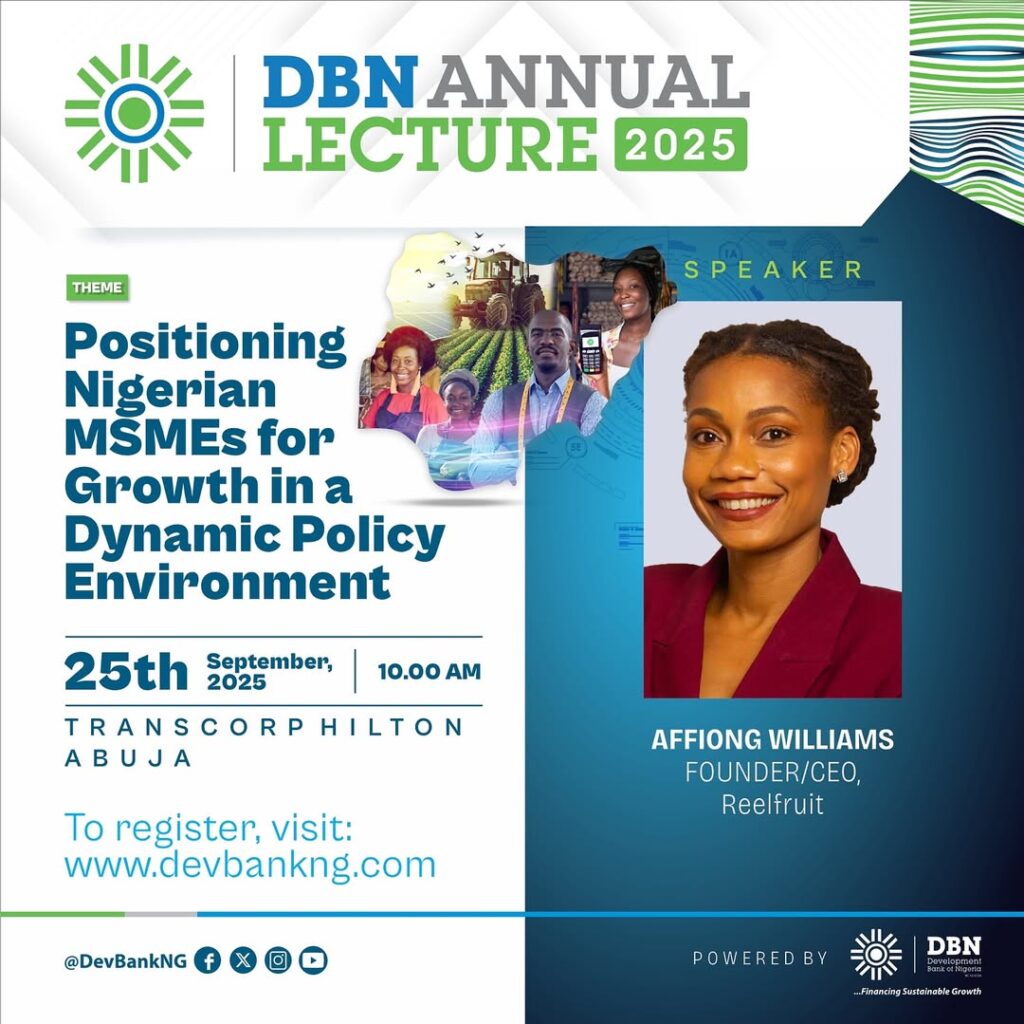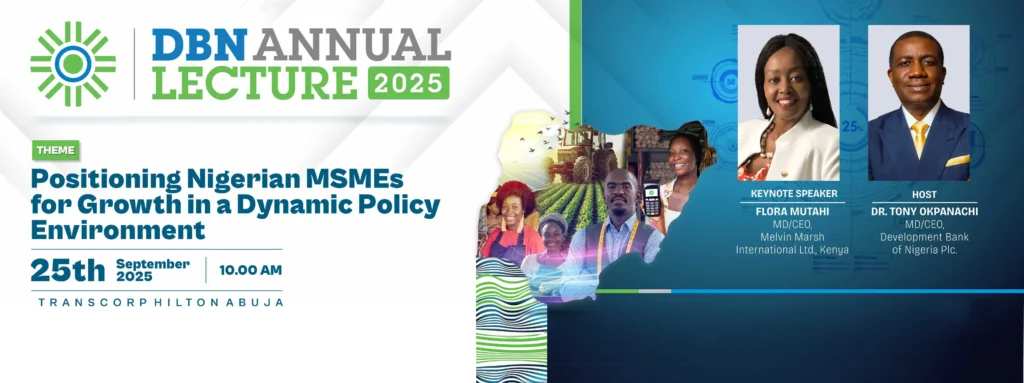In a landmark gathering under the theme “Positioning Nigerian MSMEs for Growth in a Dynamic Policy Environment”, key stakeholders from government, finance, academia, and the entrepreneurial ecosystem convened to deliberate on strategic reforms, challenges, and opportunities shaping the future of micro, small and medium enterprises in Nigeria.
The event was officially opened by Dr. Tony Okpanachi, Managing Director of Development Bank of Nigeria (DBN), who delivered the welcome address. He positioned DBN as the chief host and galvanizer of the lecture series, underscoring its role as a convener of ideas for MSME development. Acknowledging that Nigerian MSMEs have in past years faced severe headwinds, Dr. Okpanachi struck an optimistic tone: through DBN-facilitated partnerships with financial institutions, 1.175 million MSME beneficiaries have been supported—sustaining jobs and building entrepreneurial dreams. He quoted Dr. Ngozi Okonjo-Iweala, observing that “investing in small businesses is investing in our development,” and encouraged participants to engage with exhibition pavilions to explore DBN’s offerings. His hope, he said, was that attendees would leave not just informed, but also connected and equipped with strategies to thrive.

The keynote address was delivered by Dr. Tope Fasuwa, Special Adviser to the President on Economic Affairs, standing in for Vice President Kashim Shettima. Dr. Fasuwa congratulated DBN for orchestrating the lecture series and lauded its governance and impact. He aligned the lecture theme with the Renewed Hope Agenda of the administration, citing bold policy moves—such as fuel subsidy removal, exchange rate reforms, and expanded funding windows via DBN—as evidence of the government’s will to rejuvenate business conditions. He stressed that these reforms are intended to spur growth across infrastructure, technology, climate financing, poverty reduction, and human capital development. He urged participants to view the policy shifts as opportunities, rather than obstacles, and to applaud government participation in enabling a more conducive business climate.
The first female chairperson of KEPSA, Flora Mutahi, delivered a stirring keynote. She began by highlighting that while SMEs account for about 22 % of enterprises in Africa, their contribution to global GDP reaches 44 %. Yet, that is still inadequate due to fragmented markets and limited capital flows. With 12 million youths entering the job market annually but only 3 million jobs created, she challenged stakeholders: how can Africa truly build on the power of its MSMEs?

Flora narrated her entrepreneurial journey, emphasizing that standing out requires daring to deviate from the norm. She urged entrepreneurs to follow their consumers where they are, reinforcing that market alignment is central to sustainable growth. Her discourse tackled four dimensions of the MSME challenge:
- Purpose & survival — She insisted that survival rates depend on clarity of purpose; many firms perish because they lack a strong value proposition.
- Capacity & value creation — Entrepreneurs must ask: how much value are you delivering, and to whom? Scaling demands viable business models and systems.
- Governance & systems — Her mantra: “work on your business, not just in it.” Documentation, process discipline, and systemizing operations are non-negotiable.
- Marketing & customer intelligence — Marketing is not luck but a repeatable system; knowing your customer, capturing data, and iterating offerings are essential.
She also dwelt on leadership mindset and collaboration. Quoting “alone is fragile, together is powerful,” she urged that better to have “a slice of an ocean than 100 % of a pond.” She left the audience with questions: What will you change? What will you address?
The panel was moderated around policy issues, featuring Prof. Aliyu Dahiru Muhammad, Prof. of Economics at Bayero University Kano, and Jelani Aliyu (founder, Jelani Aliyu Consulting, Qatar), along with Affiong Williams and Prince Arthur Uche, who focused on support for local innovation hubs.
Prof. Aliyu painted a clear picture of the microeconomic constraints facing Nigerian MSMEs: primary among them is a dearth of funding. He called for scaling up financial support to build more resilient enterprises. He also advised against overregulation, advocating for risk-based regulatory frameworks where high-risk sectors are more closely supervised, while MSMEs—especially in less systemically critical sectors—are not burdened with excessive compliance burdens.
Jelani Aliyu offered a vision for Nigeria’s future as a hub of innovation, likening it to a “Silicon Valley.” He reminded the audience that although Nigeria is sometimes said to be trailing other nations, there is no reason the country cannot leapfrog. The transformation, he argued, depends on a unified, concerted effort: not just by government, but by private actors, diaspora, and local communities.
In further interventions, Prince Arthur Uche argued that transformation must begin with mindset. Entrepreneurs must learn to navigate disadvantageous policies rather than be crushed by them. He also lamented bottlenecks in accessing government funding—such as Bank of Industry or other special funds—and pressed for simplification of procedures.
Affiong Williams urged entrepreneurs to leverage Nigeria’s natural advantages—our raw materials and agricultural potential—and to engage in local advocacy where impact is more feasible. She acknowledged that national advocacy is hard, but pragmatic change often begins at state or local levels where entrepreneurs have more proximity to policymakers.
In addition, Charles Odii, Director-General / Chief Executive Officer of SMEDAN, addressed the audience on how innovation is being integrated into SMEDAN’s strategy to empower small businesses. Under his leadership, SMEDAN is rolling out digital initiatives, strengthening linkages with states, and accelerating capacity building to ensure that the entrepreneurial ecosystem is not just reactive, but forward-looking.
Overall, the gathering demonstrated unity of purpose among government, finance, academia, and entrepreneurs. The path forward is not without obstacles—but there is renewed optimism that with bold policy, inclusive structures, and collaborative energy, Nigerian MSMEs can be more firmly positioned for growth in a dynamic policy environment.
Writer: Cynthia Bassey



